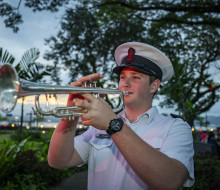
Taupō trumpeter in demand in brand new career with Royal New Zealand Navy Band
26 August 2025
Unfortunately you are viewing this website on an outdated browser which does not support the necessary features for us to provide an adequate experience. Please switch to a modern browser such as latest version of Google Chrome, Mozilla Firefox, Apple Safari or Microsoft Edge.
Ngā mihi nui
Corporal Brian Jane, from Wairoa, loves working in extreme places with the New Zealand Army.
As a combat driver with the Royal New Zealand Army Logistics Regiment, Corporal Jane has just returned from a tour of duty in Antarctica, where he managed a transport section at the United States’ McMurdo Station.
As part of the New Zealand Defence Force’s annual commitment to Antarctica New Zealand programmes, he’s one of around 100 New Zealand Defence Force personnel who work on the continent for periods ranging from two weeks to six months, depending on their role.
The transport team is responsible for the movement of freight and shipping containers around McMurdo Station as well as the most important key effort of the summer season, the supply ship off-load.
“Once a ship arrives the entire base splits into day and night shifts.
“I was the day shift transport section commander, responsible for ensuring that the shift runs as smoothly as possible,” he said.
The team drive left-hand-drive nine-speed Road Ranger freightliner Cascadia tractor units with 40-foot trailers to off-load the ships.
There were no problems driving on Antarctic snow, he said.
“It doesn’t settle on the road and the roads are all gravel.”
Corporal Jane said during this season two ships were unloaded.
“The first ship took us approximately seven days to unload and commence re-loading all the old containers that are required to return to New Zealand and United States.
“Then Royal New Zealand Navy ship HMNZS Aotearoa was in port to conduct a bulk refuel to the base,” he said.
Corporal Jane, 27, joined the NZ Army in 2016. He attended Wairoa Primary School, St Joseph’s Intermediate, and Napier Boys’ High School as a boarder.
Operation Antarctica was truly a once-in-a-lifetime experience getting to work with people from all over the world, he said.
“To have the opportunity to come down and experience life on the ice allows people who have never been here, me included, to be exposed to and understand some of life’s most outrageous climate conditions and how people down here adapt to live with it as a day-to-day normal occurrence.”
The most challenging part was adjusting to 24 hours of daylight.
“When you wake up in the morning prior to shift, its daylight. When you are getting ready for bed, its daylight. The body clock gets pretty weird with getting into a routine but mentally you have to tell yourself that it is time for bed otherwise you find yourself still wide awake late at night despite knowing that you are up early for a shift the next morning,” he said.
“I admire the commitment of everyone down here to be able to spend months away from family, loved ones, and home to ensure whatever job they are in is accomplished.”